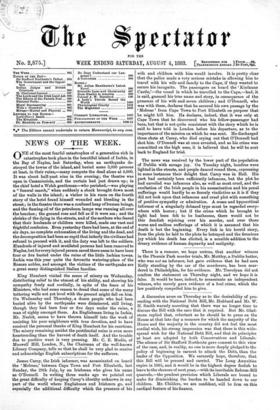A discussion arose on Thursday as to the desirability of
pro- ceeding with the National Debt Bill, Mr. Hubbard and Mr. W. H. Smith warmly asserting that there was no longer time to discuss the Bill with the care that it required. But Mr. Glad- stone replied that, reluctant as he should be to press on the House at that late day a measure for which the majority of the House and the majority in the country did not feel the most cordial wish, his strong impression was that there is this wide- spread wish for the National Debt Bill, and that its principles at least are adopted by both Conservatives and Liberals. The silence of Sir Stafford Northcote gave consent to this view of the case, and, in reality, no one is more deeply pledged to the policy of beginning in earnest to attack the Debt, than the leader of the Opposition. We earnestly hope, therefore, that this Bill will be pressed and carried. The Long Annuities expire in 1885, and it would be in the highest degree foolish to leave to the chances of next year,—with its inevitable Reform-Bill quarrels,—the prudent provision which Liberals are bound to make for diminishing the burden to be handed down to our children. Mr. Childers, we are confident, will be firm on this cardipal feature of his finance.


































